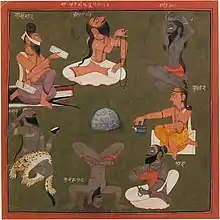सप्तर्षि
Sanskrit

Big Dipper

The Seven Sages
Alternative scripts
Alternative scripts
- সপ্তৰ্ষি (Assamese script)
- ᬲᬧ᭄ᬢᬃᬱᬶ (Balinese script)
- সপ্তর্ষি (Bengali script)
- 𑰭𑰢𑰿𑰝𑰨𑰿𑰬𑰰 (Bhaiksuki script)
- 𑀲𑀧𑁆𑀢𑀭𑁆𑀱𑀺 (Brahmi script)
- သပ္တရ္ၑိ (Burmese script)
- સપ્તર્ષિ (Gujarati script)
- ਸਪ੍ਤਰ੍ਸ਼ਿ (Gurmukhi script)
- 𑌸𑌪𑍍𑌤𑌰𑍍𑌷𑌿 (Grantha script)
- ꦱꦥ꧀ꦠꦂꦰꦶ (Javanese script)
- 𑂮𑂣𑂹𑂞𑂩𑂹𑂭𑂱 (Kaithi script)
- ಸಪ್ತರ್ಷಿ (Kannada script)
- សប្តឞ៌ិ (Khmer script)
- ສປ຺ຕຣ຺ຩິ (Lao script)
- സപ്തര്ഷി (Malayalam script)
- ᠰᠠᢒᢠᠠᡵᢢᡳ (Manchu script)
- 𑘭𑘢𑘿𑘝𑘨𑘿𑘬𑘱 (Modi script)
- ᠰᠠᢒᢐᠠᠷᢔᠢ (Mongolian script)
- 𑧍𑧂𑧠𑦽𑧈𑧠𑧌𑧒 (Nandinagari script)
- 𑐳𑐥𑑂𑐟𑐬𑑂𑐲𑐶 (Newa script)
- ସପ୍ତର୍ଷି (Odia script)
- ꢱꢦ꣄ꢡꢬ꣄ꢰꢶ (Saurashtra script)
- 𑆱𑆥𑇀𑆠𑆫𑇀𑆰𑆴 (Sharada script)
- 𑖭𑖢𑖿𑖝𑖨𑖿𑖬𑖰 (Siddham script)
- සප්තර්ෂි (Sinhalese script)
- 𑪁𑩰 𑪙𑩫𑩼 𑪙𑪀𑩑 (Soyombo script)
- 𑚨𑚞𑚶𑚙𑚤𑚶𑚮 (Takri script)
- ஸப்தர்ஷி (Tamil script)
- సప్తర్షి (Telugu script)
- สปฺตรฺษิ (Thai script)
- ས་པྟ་རྵི (Tibetan script)
- 𑒮𑒣𑓂𑒞𑒩𑓂𑒭𑒱 (Tirhuta script)
- 𑨰𑨞𑩇𑨙𑨫𑩇𑨯𑨁 (Zanabazar Square script)
Etymology
Sandhi of सप्त (sapta, “seven”) + ऋषि (ṛṣi, “sage”).
From Proto-Indo-Iranian *saptá (“seven”) and Proto-Indo-Iranian *r̥šíš (“seer”). Cognate with Avestan 𐬵𐬀𐬞𐬙𐬀 (hapta, “seven”) and Avestan 𐬆𐬭𐬆𐬱𐬌𐬱 (ərəšiš, “seer”)
Pronunciation
Noun
सप्तर्षि • (saptarṣi) stem, m
- (Hinduism) Saptarshi. The seven seers of ancient India who are extolled in the Vedas, and other Hindu literature.
The Mahābhārata acknowledges the names of seven rishis as: Marīci, Atri, Aṅgirā, Pulaha, Kratu, Vasiṣṭha, Pulastya and Kaśyapa.
According to Śatapatha Brāhmaṇam and Bṛhadāraṇyaka Upaniṣad the names of seven sages are: Gautama, Bharadvāja, Viśvāmitra, Jamadagni, Vasiṣṭha, Kaśyapa and Atri.
The Kṛṣṇa-Yajurveda in the Sandhyā-vandana Mantras has it as: Aṅgirā, Atri, Bhṛgu, Gautama, Kaśyapa, Kutsa and Vasiṣṭha. - (astronomy) the main seven brightest stars of the constellation Ursa Major/Great Bear. Also known as Big Dipper (US) / Plough (UK).
Declension
| Masculine i-stem declension of सप्तर्षि (saptarṣi) | |||
|---|---|---|---|
| Singular | Dual | Plural | |
| Nominative | सप्तर्षिः saptarṣiḥ |
सप्तर्षी saptarṣī |
सप्तर्षयः saptarṣayaḥ |
| Vocative | सप्तर्षे saptarṣe |
सप्तर्षी saptarṣī |
सप्तर्षयः saptarṣayaḥ |
| Accusative | सप्तर्षिम् saptarṣim |
सप्तर्षी saptarṣī |
सप्तर्षीन् saptarṣīn |
| Instrumental | सप्तर्षिणा / सप्तर्ष्या¹ saptarṣiṇā / saptarṣyā¹ |
सप्तर्षिभ्याम् saptarṣibhyām |
सप्तर्षिभिः saptarṣibhiḥ |
| Dative | सप्तर्षये saptarṣaye |
सप्तर्षिभ्याम् saptarṣibhyām |
सप्तर्षिभ्यः saptarṣibhyaḥ |
| Ablative | सप्तर्षेः saptarṣeḥ |
सप्तर्षिभ्याम् saptarṣibhyām |
सप्तर्षिभ्यः saptarṣibhyaḥ |
| Genitive | सप्तर्षेः saptarṣeḥ |
सप्तर्ष्योः saptarṣyoḥ |
सप्तर्षीणाम् saptarṣīṇām |
| Locative | सप्तर्षौ / सप्तर्षा¹ saptarṣau / saptarṣā¹ |
सप्तर्ष्योः saptarṣyoḥ |
सप्तर्षिषु saptarṣiṣu |
| Notes |
| ||
Borrowed terms
- → Bengali: সপ্তর্ষি (śôptorśi)
- → Hindi: सप्तर्षि (saptarṣi)
- → Marathi: सप्तर्षी (saptarṣī)
- → Odia: ସପ୍ତର୍ଷି (sôptôrṣi)
- → Punjabi: ਸਪਤਰਿਸ਼ੀ (saptariśī)
- → Tamil: சப்தரிஷி (captariṣi)
- → Telugu: సప్తర్షులు (saptarṣulu)
- → Malayalam: സപ്തർഷികൾ (saptaṟṣikaḷ)
References
- Monier Williams (1899) “सप्तर्षि”, in A Sanskrit–English Dictionary, […], new edition, Oxford: At the Clarendon Press, →OCLC, page 1150/1.
This article is issued from Wiktionary. The text is licensed under Creative Commons - Attribution - Sharealike. Additional terms may apply for the media files.